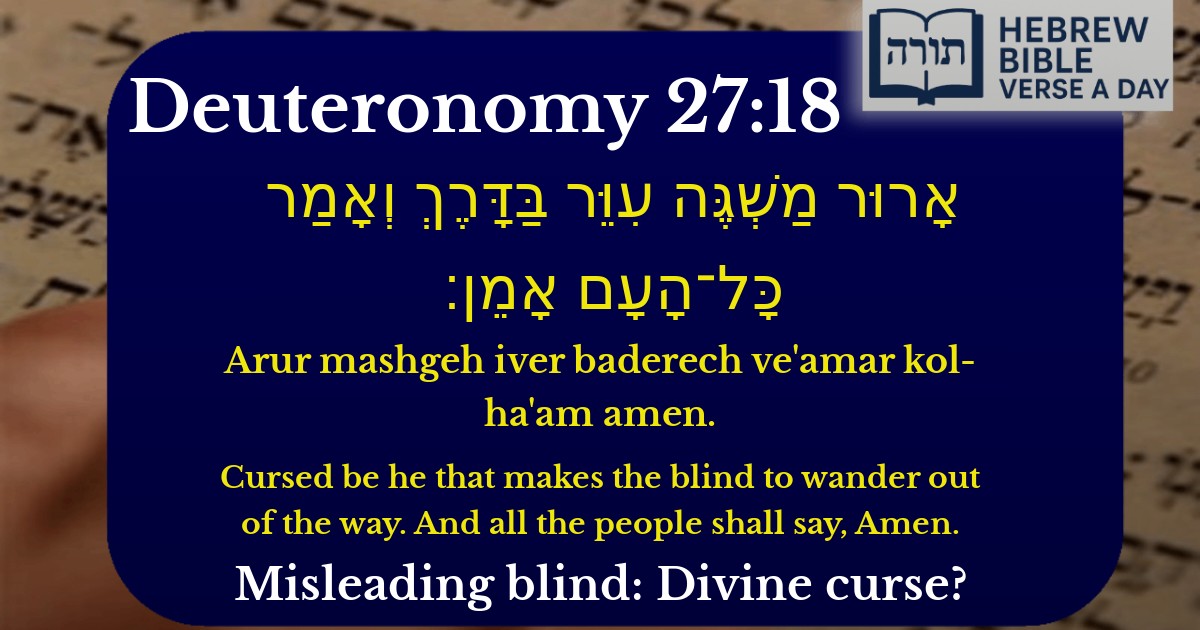Join Our Newsletter To Be Informed When New Videos Are Posted
Join the thousands of fellow Studends who rely on our videos to learn how to read the bible in Hebrew for free!
Hebrew Text
אָרוּר מַשְׁגֶּה עִוֵּר בַּדָּרֶךְ וְאָמַר כָּל־הָעָם אָמֵן׃
English Translation
Cursed be he that makes the blind to wander out of the way. And all the people shall say, Amen.
Transliteration
Arur mashgeh iver baderech ve'amar kol-ha'am amen.
Hebrew Leining Text
אָר֕וּר מַשְׁגֶּ֥ה עִוֵּ֖ר בַּדָּ֑רֶךְ וְאָמַ֥ר כׇּל־הָעָ֖ם אָמֵֽן׃ <span class="mam-spi-samekh">{ס}</span>
אָר֕וּר מַשְׁגֶּ֥ה עִוֵּ֖ר בַּדָּ֑רֶךְ וְאָמַ֥ר כׇּל־הָעָ֖ם אָמֵֽן׃ {ס}
🎵 Listen to leining
Parasha Commentary
📚 Talmud Citations
This verse is quoted in the Talmud.
📖 Sotah 37b
The verse is cited in the context of discussing the curses pronounced at Mount Ebal, emphasizing the seriousness of misleading the blind.
📖 Sanhedrin 43b
Referenced in a discussion about the ethical implications of causing others to sin, paralleling the act of misleading the blind.


Literal Interpretation (Peshat)
The verse (Devarim 27:18) pronounces a curse upon one who deliberately misleads a blind person, causing them to stray from their path. Rashi explains that this refers to a literal act of deception against someone who is physically blind, emphasizing the severity of taking advantage of a person's disability. The entire nation responds "Amen," affirming the curse as a collective moral stance against such behavior.
Allegorical Interpretation (Derash)
Midrash Tanchuma expands the meaning beyond the physical, interpreting "the blind" as someone who is morally or spiritually unaware. The curse applies to one who intentionally leads others astray in matters of halacha (Jewish law) or ethical conduct. Rambam (Hilchot De'ot 2:6) warns against misleading others in matters of truth, as this corrupts both the individual and society.
Halachic Implications
Moral and Ethical Dimensions
Rabbeinu Bachya notes that this curse highlights the Torah's particular concern for protecting vulnerable members of society. The Netziv (Ha'amek Davar) adds that the public response of "Amen" demonstrates society's responsibility to uphold justice and prevent exploitation of the weak.
Contemporary Application
Modern poskim like Rabbi Moshe Feinstein (Igrot Moshe, CM 2:30) apply this principle to cases of:
- Financial deception (geneivat da'at)
- Misleading advertising
- Withholding critical information from those who rely on our counsel
The inclusion of this curse among those proclaimed on Mount Gerizim underscores its fundamental importance in Jewish ethics.